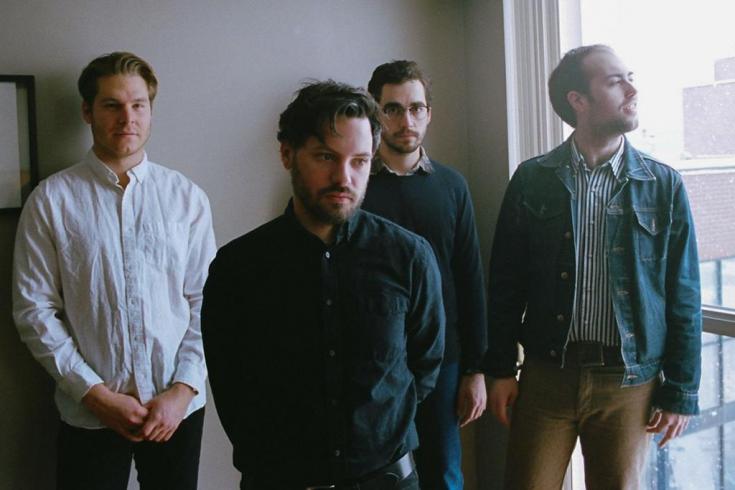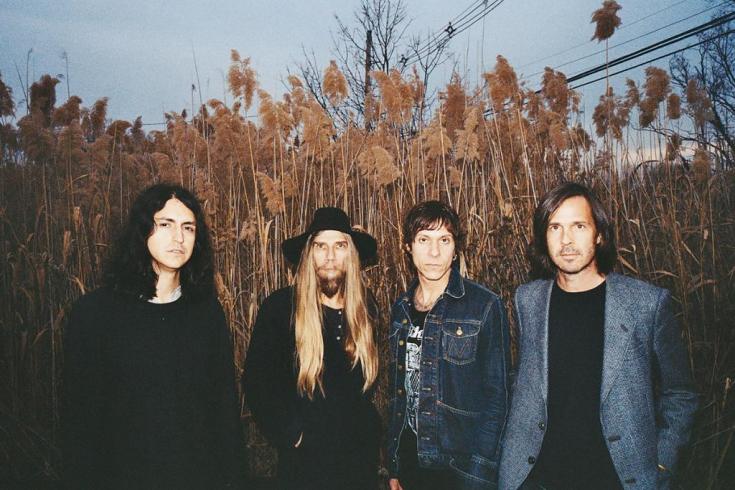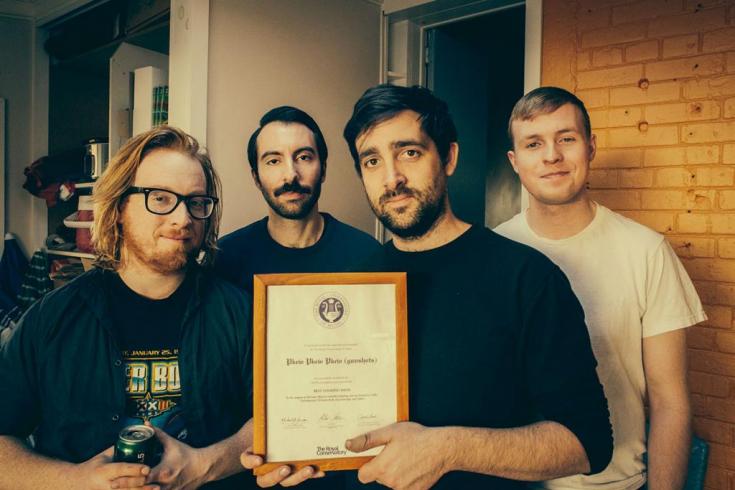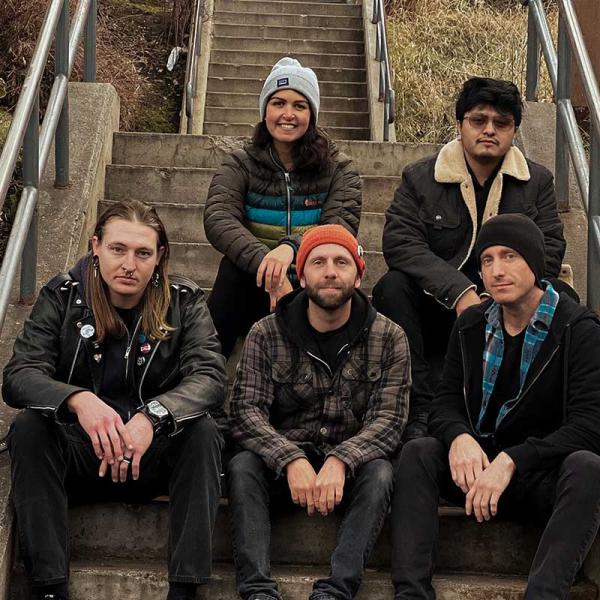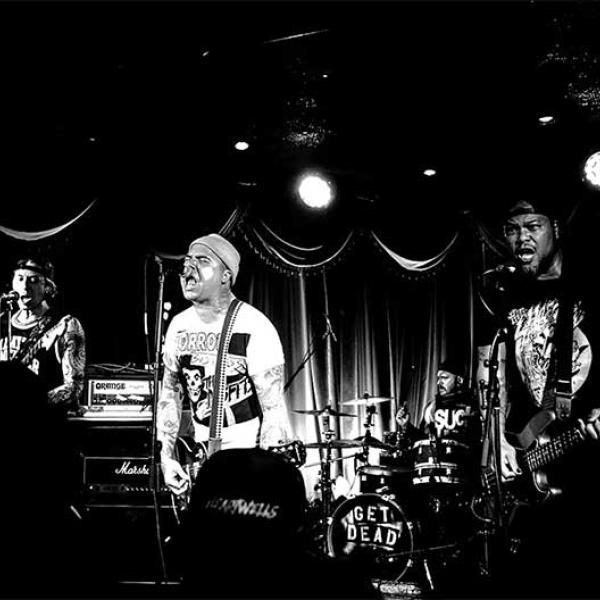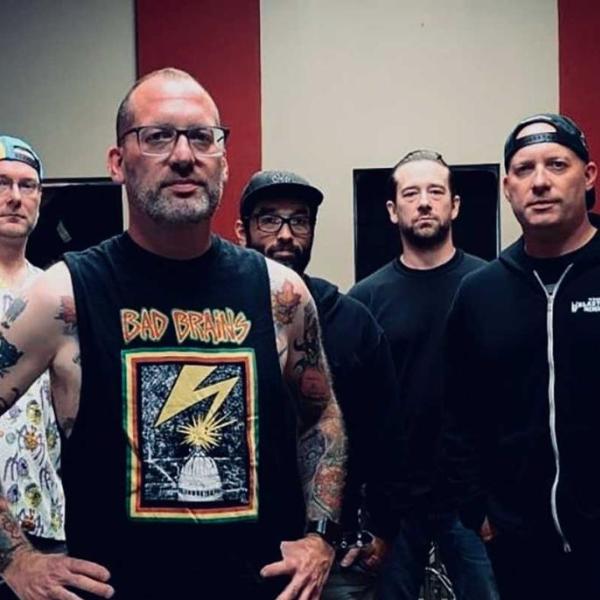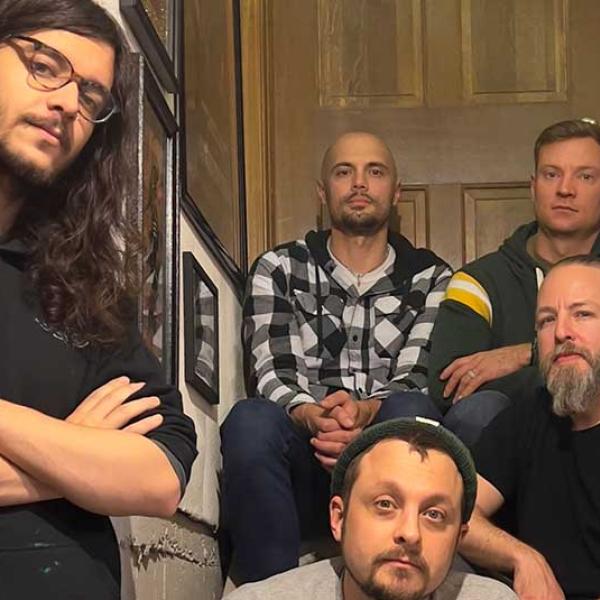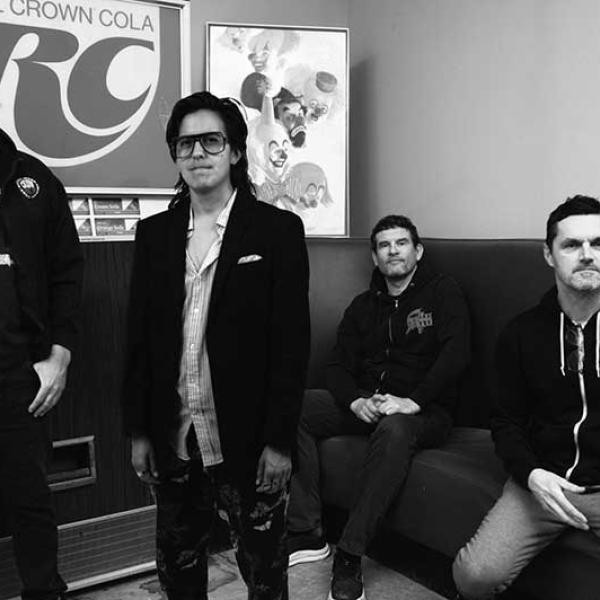Features

- by Christophe Vanheygen
When Toronto’s Pkew Pkew Pkew burst onto the scene, they were the kind of band that incited moshpits at every show and then drank until the bruises stopped hurting. And while Mike Warne (guitars/vocals), Ryan McKinley (guitars/vocals), Emmett O’Reilly (bass/vocals) and David Laino (drums) still like to party, they have become better at being in a band while hungover. Which brings us to their phenomenal new album, showing a more mature Pkew Pkew Pkew. Hell, there’s even a sax solo in one of the songs… can’t get more mature than sax solos. We caught up with Mike to get all the news on ‘Optimal Lifestyles’.
PRT: First of all… congrats! ‘Optimal Lifestyles’ seems to be creating quite some buzz already. Does that kinda reaction reassure you or does it make things more stressful?
Mike: Definitely reassuring. It’s been a long road to releasing this album and we’re so excited for it. Any stress that comes from it is just because there’s more to do now, which is a good thing. We can’t wait to get on the road playing new songs and to see where this one takes us. We already have more European shows booked than ever before, so that is very cool.
PRT: How do your ‘Optimal lifestyles’ compare to today’s yoga-fitness-gluten-free-show-my-abs-on-Instagram lifestyles?
Mike: I think a lot of our days start with those sorts of good intentions in mind or as goals, but by the time the night rolls around, things have usually fallen apart. I think, personally, my most optimal lifestyle day would involve me doing like one thing that I see as important or adult, and then feeling great about that one thing when I go out for beers later or watch 3 football games in a row.
PRT: You have had a bit of a “party-hard” reputation up until now. You already stated somewhere that you kind of cleaned up your act. A sense of maturity, or professionalism?
Mike: I think it’s just natural professionalism and maturity in the sense that we just did get a little better—we’re still going to party, we’re just better at being a band than ever before, so it’s getting easier to deal with the long nights and early mornings and issues that arise where you might wish you weren’t hungover. I guess we’ve practiced that.
PRT: Has that reputation ever come back to haunt you? Like, what’s the worst thing that happened to Pkew Pkew Pkew due to excessive drinking?
Mike: Hmm. I don’t really know. We’ve led a charmed life. I think we do a good job surrounding ourselves with great people, especially drinking buddies. We’ve never missed a show, or a recording session, or anything important. If anything, especially in Europe, we get really excited about seeing new places and we stay up way too late, usually making the people we’re staying with take us on a tour of their town. So, the worst thing that happens to us is that we are tired all the time.
PRT: And what was the best thing that happened? That you can still remember.
Mike: Last week I started downloading all of our old show posters because I am awful at remembering things and I need a visual—it’s helping. There are so many great things that have happened to us; one night in Wisconsin we climbed a roller coaster and drank beers on the tracks. I feel liquid confidence is a real thing, and if harnessed correctly, a powerful tool.
PRT: It’s no secret that you got a little help from Craig Finn on the record. Which is very, very cool. What’s the most important thing you learned from that collaboration?
Mike: Work ethic, and to actually edit yourself. He’s one of the best songwriters in the world because he tries to be, he puts in the hours. That’s something I took that I’ll use from now on. If you think the song is done, try to say it a different way, maybe it won’t be as good, maybe it will be better. Either way, you have to challenge yourself to stay good.
PRT: Finn recently talked about how he wrote a lot about partying and getting wasted in Lifter Puller, about getting wasted but also the hangover while in The Hold Steady and with his recent solo work, about people who are on the other side of all of it. Is it fair to say that there is a similar kind of tonal shift on your new album?
Mike: Ya, one important thing to me is that I am honest about what’s going on in my life and the band’s life. We’re older now than the first album, obviously, and so are you, I bet we still have lots in common. I think our first album was about partying, and our second is about dealing with the repercussions and looking forward in a realistic way. The idea of being in a band as a career is a dumb one, one of the hardest careers in the world. The tonal shift isn’t intentional, it’s just the result of being honest and believing that people will appreciate that and identify with it because at the end of the day, we’re all essential dealing with the same stuff.
PRT: It’s not just the lyrics. Musically as well, you seem to have dialed things down instead of going full throttle the entire time. Did those two things happen simultaneously or did one influence the other?
Mike: I’m not sure, usually when I come up with a Pkew song it starts with one line that I really like, which I would know the melody of instantly, that sort of dictates the tempo and I don’t really play around with that spontaneity too much. I think we all wanted to be more dynamic this time around. We bashed through the last album, and it was so much fun. We just wanted to go a different way this time. AND, we’re excited to play it live because a mix of the old and the new is gonna be a killer set. I think.
PRT: If you could choose anyone – alive or dead – that you’d still want to get in the studio with, who would it be and why?
Mike: We would record our third album, fully finish it, then invite Clarence Clemons in to play sax over every song with no direction and no one from the band could stay in the studio, and then the first time we hear it is on release day.
PRT: Speaking of saxophones, ‘Point Break’ comes with an epic sax solo. Which could be considered a ‘un-punk’ thing to do. Unless you’re Fear, Murphy’s Law or a ska punk band, I guess. Where did that idea come from?
Mike: Tasteful sax solos make people happy. It came from people like Bruce Springsteen and Clarence Clemons. The song didn’t need sax—no one would be like “where’s the sax?”—but oh man is it ever cool with it. Our friend Kaan Gunesberk played it.
PRT: What’s your all-time favorite sax solo?
Mike: Kaan Gunesberk’s solo in Point Break. I feel fine saying that, we had nothing to do with it.
PRT: I’m guessing you all still have day jobs to be able to deal with Toronto’s rent increases. But what would be your dream job to support life as a touring punk rocker and why would you be so good at it?
Mike: Professional twitch player or whatever the kids do. If we could just play video games in the van that would be a dream come true. The reason we’d be good at it is the same reason that Craig is good at writing songs. We never stop getting better and we put in the hours. We may not win every Super Bowl, but yes we will, it’s a video game, we’ll just turn the difficulty down.


